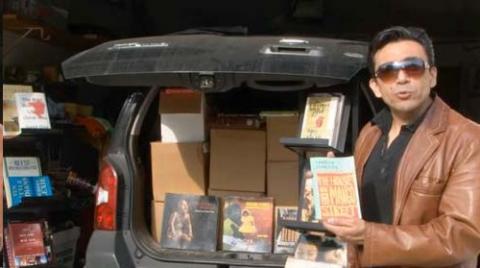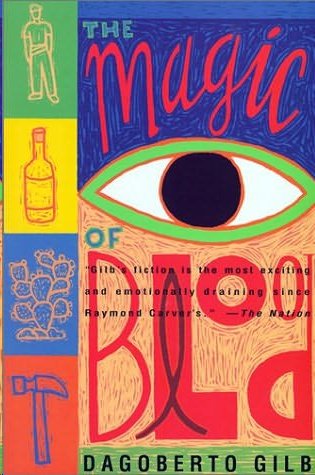Book Smugglers Fight a Notorious Book Ban in Arizona

From New America Media:
PHOENIX -- Tony Diaz, aka “El Librotraficante” (or book smuggler) is arriving in Tucson on Friday with a truckload of Mexican-American books that were effectively banned from the Tucson Unified School District (TUSD) to distribute to a network of “underground libraries.”
The caravan, which started in Houston on March 12, aims to draw attention to a state law in Arizona banning ethnic studies that was used by politicians to shut down a Tucson Mexican-American Studies Program and literally box its books away.
“Every great movement is sparked by outrage at a deep cultural offense,” said Diaz, founder of Nuestra Palabra: Latino Writers Having Their Say, a group that promotes Latino authors and culture. “Latinos are not the sleeping giant; we’re the working giant. When any state in this nation passes an anti-Latino law they’ll know we’ll respond together,” he said.
Authors and publishers have joined the cause by donating and re-printing books: Wings Press, for example, reprinted one of the banned books, “Curandera” by Carmen Tafolla, and donated 100 copies to take on the road to Tucson, said Diaz.
Some books will be brought by the authors themselves in a bus; others are being shipped to underground libraries.
Several libraries in different cities across the country are being used to hold “teach-ins” and “read-ins,” according to Diaz, but the goal is to turn them into lasting cultural magnets for Mexican-American studies.
Dagoberto Gilb and Helena Maria Viramontes are among the writers who will be participating in an event on Saturday in Tucson.
“I had two books on the banned list—‘The Magic of Blood’ and ‘Woodcuts of Women’—so I’m very honored. I’m humbled,” wrote Gilb in a columned published in The Progressive.
He later wrote: “Of course this banning is raw, ugly racism. But may I suggest that it’s good it’s out in the open and publicly displayed? And with this we teach metaphor: our literature has always been put away, carted to storage. What’s new is that books got out, to ambitious, bright young people no less, and now have been confiscated. Doesn’t that sort of describe the Mexican American experience for the last 200 years? We’re not treated as if we’re from here, that we have our history here, that our land and history is part of the country’s land and history.”
Diaz agrees with Gilb that Arizona’s ethnic studies ban, HB 2281, ironically has served to shed more light on Latino studies and Latino literature.
He calls it a “new renaissance” for Latinos. But the caravan isn’t only trying to attract the attention of one ethnic group. Saturday’s events in Tucson will also celebrate Saint Patrick’s Day, with a Santo Patricio Battalion Celebration and readings of prose by various authors in the caravan.
On Dec. 27 an Arizona judge ruled that Tucson’s Mexican American studies classes were in violation of a 2010 law that bans ethnic studies when they allegedly promote the “overthrow of the U.S. government.” As a result, the classes were suspended and the books were removed from the classroom.
Tuscon Unified School District administrators said they only removed seven books that were cited in the judge’s ruling, including “Critical Race Theory” by Richard Delgado, “500 Years of Chicano History in Pictures” edited by Elizabeth Martinez, “Occupied America: A History of Chicanos” by Rodolfo Acuna and “Pedagogy of the Oppressed” by Paulo Freire.
But Diaz and founders of the Mexican American studies program contend that administrators removed more than 85 books from the classroom that were part of the curriculum for Mexican-American studies.

These included books such as “The House on Mango Street” by Sandra Cisneros, one of the writers who joined the caravan in San Antonio.
Tucson District officials explain that the books weren’t banned. “Every one of the books listed above is still available to students through several school libraries,” TUSD said in a statement.
But Sean Arce, the teacher who ran the Mexican American Studies program, said these books were not available in all libraries. “They’re very inaccessible; the bottom line is they were restricted from being used. The law didn’t call for a banning of book; it called for the dismantling of the classes,” Arce said.
“What fascinates me with the Tucson School District is that they’re playing with words,” added Diaz. “They know the American people wouldn’t tolerate a ban; they’re hiding oppression.”
Diaz said Arizona’s law to ban ethnic studies could spread to other states in the same way that SB 1070 did. That law, which made it a state crime to be an undocumented immigrant and was partially enjoined by federal judges, heads to the Supreme Court next month. But in the meantime, five other states – Georgia, Alabama, Utah, Indiana and South Carolina – have enacted their own versions modeled after the Arizona law.
“Arizona has perpetrated a message to make our people illegal; other states copied those anti-immigrant laws,” said Diaz. “Now they’re making our history illegal. They’ve gone too far. If we allow this law to stand, it too will spread.”
Teachers and students have filed a lawsuit challenging the constitutionality of the ethnic studies ban; the case goes before a U.S. District Court federal judge in Tucson on March 19. They contend that an audit commissioned by Superintendent of Education John Huppenthal himself found “no observable evidence” that Mexican American studies violated the law.
Huppenthal, however, presented other findings to Judge Lewis Kowal alleging that “students were being indoctrinated to develop resentment on a racial basis.”
“If they condone the fact that this law exists, they’re implying that Latinos promote the overthrow of the government and we do not,” said Diaz.
For a schedule of events of the caravan visit www.librotraficante.com
Photo on the main page: FoundSF.org





























































































































































































































































































































